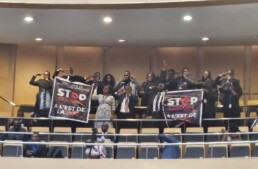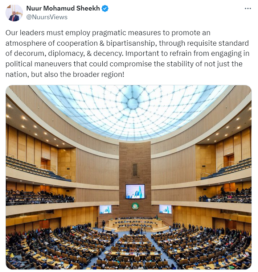Drama filled 37th African Union summit triggering question if it is an institution reforming or deforming
Date | 24 February 2024
Tefesehet Hailu
Researcher, Amani Africa
Tsion Hagos
Program Director, Amani Africa
Solomon Ayele Dersso, PhD
Founding Director, Amani Africa
As the dust of the 37th ordinary session of the African Union (AU) Assembly that ended on 19 February 2024 at the headquarters of the AU, in Ethiopia’s capital Addis Ababa settles, questions abound about what the dramatic scenes witnessed during the summit highlight about the state of the Union.
This Assembly came at a critical moment when the leadership and collective action of the membership of the AU to address the plethora of political, socio-economic and security challenges facing Africa are in huge demand. The opening speech of the AU Commission Chairperson, Moussa Faki Mahamat, made this clear when he rightly asked, for example, ‘[h]ow should we stop watching terrorism ravage some of our countries without doing anything?’.
Regrettably, the summit did not fit the bill in terms of delving into and adopting meaningful policy action for addressing the pressing issues of this ‘heroic and glorious time’, as Faki dubbed it. However, it is not because, as one report erroneously put it, the summit ignored the ‘continent’s conflicts and political crises’. Indeed, from Faki’s clarion call for collective action through the various high-level meetings, these issues were not ignored.
“The summit did not fit the bill not because, as one report erroneously put it, it ignored ‘the continent’s conflicts and political crises.’”
A mini-summit was convened on the escalating conflict in Eastern DRC. The AU ad-hoc committee of five on South Sudan held a ministerial meeting. The Horn of Africa’s regional body the Inter-Governmental Authority on Development (IGAD) Chairperson, Djibouti’s President, also initiated steps for the convening of an IGAD meeting on Somalia and Sudan, although this plan collapsed in the face of the drama that followed an incident involving Somalia’s President.
Apart from such high-level meetings on these conflict situations on the margins of the summit, the AU Assembly considered and deliberated on a report of the high-level committee on the situation in Libya. The summit also deliberated on all these and a range of other conflict situations as part of its consideration of the Report of the Peace and Security Council on its activities and the state of peace and security.
Rather than lack of attention, what this summit could be faulted for is the inability of the conveners and participants of the summit to marshal consensus and adopt concrete measures for at least mitigating, if not effectively managing, the escalating tensions, crises and conflicts. Considering the global policy process for reform of the multilateral system, particularly within the framework of the Summit of the Future which is of strategic interest for Africa, this summit was also a missed opportunity for outlining an African common position as we argued here.
“Rather than lack of attention, what this summit could be faulted for is the inability of the conveners and participants of the summit to marshal consensus and adopt concrete measures for at least mitigating, if not effectively managing, the escalating tensions, crises and conflicts.”
Apart from the solid work done around AU’s priorities and modalities for the activation of its permanent membership in the G20 and the timely engagement on the reform of the global financial architecture, it is not evident what the AU can show for in finishing the summit at dawn on 19 February rather than as initially planned on 18 February.
“It is not evident what the AU can show for in finishing the summit at dawn on 19 February rather than as initially planned on 18 February.”
Beyond failing to deliver on the pressing issues facing the continent, as some including delegations of member states observed, this year’s summit was also unlike earlier summits in other respects. It was filled with dramatic events that highlighted lack of decorum, dwindling regard for AU processes and a complete absence of amity between governments of some countries.
“It was filled with dramatic events that highlighted lack of decorum, dwindling regard for AU processes and a complete absence of amity between governments of some countries.”
During the opening session of the heads of state and government meeting, about a dozen people staged a protest on the conflict in Eastern DRC from the press and observer gallery of Mandela Hall. The incident, involving shouting of slogans and displaying banners and physical signs, briefly disrupted the proceedings.

Before the start of the main summit, a mini-summit bringing together key regional states was held on the escalating conflict in Eastern DRC. Rather than serving as a platform for bridging the divide between the two countries, the mini-summit became a site for trading of accusations between the two countries.
Nothing came out of the mini-summit. Even more worryingly, the bitter exchanges between the leaders of DRC and Rwanda might have hardened the positions of the two countries, hence worsening the situation further.
Another dramatic event involved the protocol dispute concerning the President of Somalia. Apart from the bitter exchanges that were on display both in the closed-closed segment of the summit and persisted during the summit, President Hassan Sheikh Mohamud of Somalia insinuated that Ethiopian authorities tried to sabotage his participation in the AU summit. Rather than the use of institutional and diplomatic channels of the AU and perhaps signifying a lack of confidence in such channels, the President convened a press conference on the incidents that almost overshadowed the coverage of other aspects of the summit. In opting for taking the matter to the wider public and litigating it in the court of public opinion, it is far from clear that, beyond galvanizing Somalia’s public opinion, President Mohamud’s approach has actually earned the sympathy and support of the wider AU membership.
In respect of both the escalating tension between DRC and Rwanda and that of Somalia and Ethiopia, what is problematic is not simply the resort to grandstanding and its deleterious consequences on the AU and its processes. Perhaps more damaging for the AU is the failure of the conveners and the wider AU membership to prevail over the representatives of these countries and provide leadership for helping establish appropriate channels and mechanisms, at the very least, for helping ease the escalating tensions.
It was not any less dramatic to observe the AU Commission Chairperson lamenting that the ‘rampant tendency to make decisions without real political will to apply them has grown to such an extent that it has become devastating to our individual and collective credibility,’ noting that 93% of the decisions adopted during the past three years have not been implemented. As a statement of one delegation delivered during the summit that we have seen rightly pointed out, this implementation deficit is also due to ‘the continued proliferation of decisions, emanating from the plethora of items on the Assembly’s agenda,’ contrary to the aim of the AU reform to focus on strategic priorities of continental scope by rationalizing the agenda of the summit, addressing the decision-to-implementation gap and streamlining the working methods.

All of these highlight that the AU’s standing and credibility are under tremendous strain. It is no surprise that there are increasing questions, in view of the foregoing dynamics, about whether the AU is an institution in deforming rather than reforming. Indeed, the deeper issues these incidents signify and the breakdown of trust between the AU Commission and member States and among States themselves, the critical intangible ingredient for the effective functioning of international public service institution like the AU, suggest that nothing short of the very soul of the AU is at stake.
There is no single actor to blame for this state of affairs of our Union. All those with direct role in agenda-setting and decision-making on the part of the AU Commission, organs and member states bear responsibility. It is incumbent on each of them to assume their respective responsibilities for restoring decorum and spirit of cooperation to avoid the risk of a complete collapse of the credibility and legitimacy of this institution as a locomotive of collective pan-African action. A corollary to this is also reversing the underlying crises of ideas and leadership that Faki aptly described in terms of ‘a real decline in the beautiful spirit of African solidarity and Pan-Africanism, the soul of our renaissance.’
“There is no single actor to blame for this state of affairs of our Union. All those with direct role in agenda-setting and decision-making on the part of the AU Commission, organs and member states bear responsibility.”
The content of this article does not represent the views of Amani Africa and reflect only the personal views of the authors who contribute to ‘Ideas Indaba’